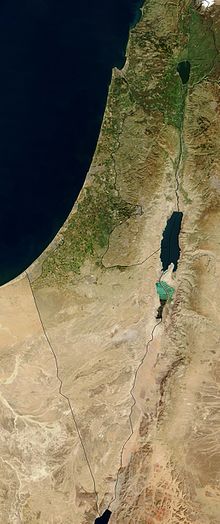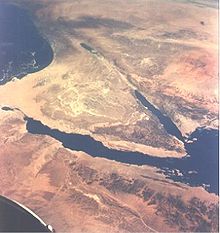约旦河大裂谷
外观
此条目翻译品质不佳。 (2018年2月28日) |

约旦河大裂谷(阿拉伯语:الغور Al-Ghor或Al-Ghawr,希伯来语:בִּקְעָת הַיַרְדֵּן Bik'at HaYarden),位于以色列、约旦和巴勒斯坦,是一个细长的谷地。地理意义上的区域包括从约旦河的源头,到胡拉谷地,加利利海,约旦河谷,再到地球上的最低点死海的整条约旦河,然后穿过阿拉伯谷,到亚喀巴湾直到红海。
历史和物理特点
[编辑]
约旦河大裂谷大约是在几百万年前的中新世,阿拉伯板块向东北移动离开非洲时形成的(23.8-5.3百万年前)。一百万年后,地中海和大裂谷之间的地面抬升,因此海水停止了向裂谷里涌入。
从各种在更深层的盆地保留的连续的沉积岩和岩浆岩,可以看出自渐新世以来的裂谷的地质和环境的演变。盆地周围露出的地层可以看出沉积和侵蚀的交替作用。[1]
大裂谷的最低点在死海,比海平面低790米,地海沿岸也是地球上的最低点,比海平面低400米左右。在西部地形急剧抬升大约1000米,相似的,裂痕在东边也是显著的地形特点。[2]死海北部的裂谷由于约旦河水和两侧山上的泉水,被长期耕种。
死海断层
[编辑]延伸到裂谷的阿拉伯板块和非洲板块边界称为死海断层,连接红海裂谷和土耳其的东安那托利亚断层。[3]
死海断层通常被认为是转换断层,阿拉伯板块已经移位约105公里。[4][5]这种解释是根据对偏移标记的观测,如河流阶地、沟渠,在几百万年内大约每年偏移几毫米。[6]GPS的数据也证实了阿拉伯板块相对于非洲板块的每年的位移率。[7]也有人认为断裂带是初期海洋扩张中心的裂谷系,红海裂谷的北部延伸。[8]
参见
[编辑]参考文献
[编辑]- ^ The Jordan Rift Valley (页面存档备份,存于互联网档案馆), 特拉维夫大学
- ^ David Eshel. Increasing Importance of the Jordan Rift Buffer. Defense Update. 3 May 2006 [2015-11-14]. (原始内容存档于2008-07-05).
- ^ The Geophysical Institute 互联网档案馆的存档,存档日期2008-06-23.
- ^ Freund R., Garfunkel Z., Zak I., Goldberg M., Weissbrod T., Derin B., Bender F., Wellings F.E. & Girdler R.W. The Shear along the Dead Sea Rift (and Discussion). Philosophical Transactions of the Royal Society of London. Series A, Mathematical and Physical Sciences. 1970, 267 (1181) [2015-11-14]. doi:10.1098/rsta.1970.0027. (原始内容存档于2016-03-04).
- ^ Joffe S. & Garfunkel Z. Plate kinematics of the circum Red Sea—a re-evaluation. Tectonophysics. 1987, 141 (1-3): 5–22 [2015-11-14]. doi:10.1016/0040-1951(87)90171-5. (原始内容存档于2019-07-07).
- ^ Begin Z.B. & Steinitz G. Temporal and spatial variations of microearthquake activity along the Dead Sea Fault, 1984–2004 (PDF). Israel Journal of Earth Sciences. 2005, 54: 1–14 [2015-11-14]. doi:10.1560/QTVW-HY1E-7XNU-JCLJ. (原始内容存档 (PDF)于2017-08-19).
- ^ Gomez, F., Karam, G., Khawlie, M., McClusky S., Vernant P., Reilinger R., Jaafar R., Tabet C., Khair K., and Barazangi M. Global Positioning System measurements of strain accumulation and slip transfer through the restraining bend along the Dead Sea fault system in Lebanon (PDF). Geophysical Journal International. 2007, 168 (3): 1021–1028. Bibcode:2007GeoJI.168.1021G. doi:10.1111/j.1365-246X.2006.03328.x. (原始内容 (PDF)存档于2015-07-13).
- ^ Mart Y., Ryan W.B.F. & Lunina O.V. Review of the tectonics of the Levant Rift system: the structural significance of oblique continental breakup. Tectonophysics. 2005, 395 (3-4): 209–232 [2015-11-14]. doi:10.1016/j.tecto.2004.09.007. (原始内容存档于2018-11-06).
32°19′02″N 35°34′12″E / 32.31722°N 35.57000°E
